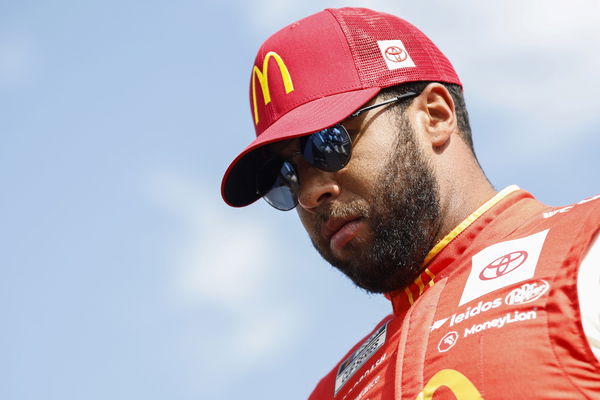
via Getty
LAS VEGAS, NEVADA – OCTOBER 16: Bubba Wallace, driver of the #45 McDonald’s Toyota, walks onstage during driver intros prior to the NASCAR Cup Series South Point 400 at Las Vegas Motor Speedway on October 16, 2022 in Las Vegas, Nevada. (Photo by Sean Gardner/Getty Images)

via Getty
LAS VEGAS, NEVADA – OCTOBER 16: Bubba Wallace, driver of the #45 McDonald’s Toyota, walks onstage during driver intros prior to the NASCAR Cup Series South Point 400 at Las Vegas Motor Speedway on October 16, 2022 in Las Vegas, Nevada. (Photo by Sean Gardner/Getty Images)
It all started with the Olympic gold-medal-hoarding sensation Simone Biles and has slowly permeated the unnecessarily rigid layers of NASCAR. We are talking about discussions surrounding mental health. What happened with Simone Biles around the 2021 Tokyo Olympics pervaded through other elite sports with more and more athletes coming out and speaking about their struggles with mental health. NASCAR too needed it to happen, and Bubba Wallace deserves some credit for helping get the ball rolling.
ADVERTISEMENT
Article continues below this ad
It’s no surprise that a highly competitive sport like NASCAR, with a largely by male presence, has traditionally shied away from conversations about mental health. But where there’s a will, there always is a way; and NASCAR’s officials have shown it with a new policy.
Recently, veteran journalist Bob Pockrass reported, “NASCAR announced it is working with RealResponse, which works with leagues, colleges, player associations, etc to allow for team members to anonymously seek help for mental health issues, as well as anonymously report issues of safety, security, abuse, harassment, integrity, etc.”
NASCAR announced it is working with RealResponse, which works with leagues, colleges, player associations, etc to allow for team members to anonymously seek help for mental health issues, as well as anonymously report issues of safety, security, abuse, harassment, integrity, etc
— Bob Pockrass (@bobpockrass) December 15, 2022
RealResponse is an industry leader that provides sportspersons a safe space to deliver concerns to their administration and seek help. The platform facilitates secure reporting and monitoring of feedback with the added benefit of complete anonymity. NASCAR has done well to employ the services of RealResponse. This is a much-needed move that will prove helpful for both drivers and crew, particularly the young.
NASCAR and mental health struggles—Bubba Wallace et al.
Bubba Wallace has been in the Cup Series for six years and has been racing for a much longer time. Competing at the highest level in an unforgiving sport, compounded by the fact that he is the only full-time African-American driver on the Series, can take a heavy toll on mental peace.

via Getty
BRISTOL, TENNESSEE – SEPTEMBER 17: Bubba Wallace, driver of the #45 MoneyLion Toyota, looks on in the garage area after mechanical issue during the NASCAR Cup Series Bass Pro Shops Night Race at Bristol Motor Speedway on September 17, 2022 in Bristol, Tennessee. (Photo by Sean Gardner/Getty Images)
He first shared his gloom in 2019 on Twitter, stating, “Haven’t been a good place for some time now, but rolling under the stands after the race and hearing everybodys (sic) shouts and support, was nice. Appreciate y’all.”
ADVERTISEMENT
Article continues below this ad
He also put out another tweet that said, “Ha..with a laugh and smile like this every week you’d think there is no way one could mask so much negative and dark 💩. Lonely dark roads ain’t fun, keep on keeping on I guess.” The tweet was accompanied by pictures of him smiling and enjoying.
But no one knew the story behind it all, till his interview surfaced a few days later. A vulnerable Bubba opened up about his struggles with mental health, “You try to be the best you can and sometimes it ain’t damn good enough. I’ll be damned. It all goes away when you get behind the wheel. It’s 16 years of driving. It helps. But it’s tough.” With a heavy voice, he added, “I’m on the verge of breaking down. And I am what I am,” and gave way—he started crying. The resolve had broken.
ADVERTISEMENT
Article continues below this ad
Bubba was probably the first driver in NASCAR to have spoken up about depression and mental health, thus giving other drivers confidence to open up about it. Cody Ware and Jimmie Johnson have been some of the other drivers who have spoken up since that Bubba interview, and he deserves to be appreciated for this.
Watch This Story: Dale Earnhardt Jr’s $14 Million Dream NASCAR Project Sees Major Upgrades Before All-Important Event
ADVERTISEMENT
ADVERTISEMENT
ADVERTISEMENT
ADVERTISEMENT

